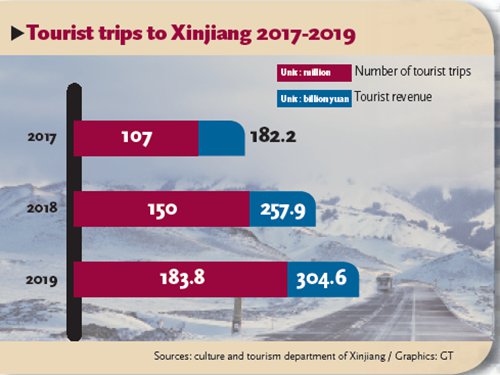HOME >> CHINA
Xinjiang takes advantage of Beijing 2022 Winter Olympics to develop snow tourism
By Liu Xin and Shan Jie Source:Global Times Published: 2019/10/24 20:13:40

Herdsmen take part in a Kazak wrestling match in a snowfield during the opening ceremony of the snow and ice tourism festival in Zhaosu county, Northwest China's Xinjiang Uyghur Autonomous Region, on January 16, 2016. Photo: VCG
Urumqi saw its second snow of the winter on Wednesday.
Winter arrives in Northwest China's Xinjiang Uyghur Autonomous Region earlier than most part in the country.
Taking advantage of the snow, Xinjiang has sent out invitations to promote their winter tourism.
The largest provincial region in China, Xinjiang has great resources to develop winter tourism. With the Beijing 2022 Winter Olympics approaching, snow tourism in Xinjiang is trending.
The region recently designed 10 featured routes and carried out policies intended to better attract tourists from around China and abroad.
Ice and fire
On October 16, promotional events for Xinjiang's winter tourism were held in Beijing, Shanghai and other cities across China.
The Xinjiang government introduced 10 routes they designed for tourists visiting during the winter season.
"Ice and fire" is recommended as the first route on the list. In the 8-day-trip, tourists could visit Tianchi Lake, an alpine lake and world nature heritage site near the Tianshan Mountains, and Kanas National Geopark, home to a mythical monster similar to one in Loch Ness. Tourists can also enjoy a hot spring during the trip.
Another 8-day-trip would feature the unique natural and cultural scenes in southern Xinjiang.
The routes include skiing in Narat grassland under the Tianshan Mountains, watching ice on Sayram Lake in northwestern Xinjiang and a driving experience in Turpan, a dry basin famous for its grape farms.
Over the past two years, stability has benefited Xinjiang and tourism developed greatly under this circumstance, Bu Dengke, an employee from the Xinjiang culture and tourism department, said during the promotional event in Beijing.
The autonomous region has seen tourism as a key sector and engine of high-quality development in Xinjiang, Bu said.
Altay, which is located at the north end of the region with mountains bordering Russia, has great advantages for developing winter tourism.
Hu Jinliang, an official from the publicity department of Fuyun county in Altay Prefecture, told the Global Times that local government has made a full plan for the upcoming winter tourism.
"Roads to the ski resort in Fuyun county have been updated and the projects to update other infrastructure are expected to be accomplished before November. We also have helicopters to send people to the ski resort," Hu said.
Since Beijing is hosting the 2022 Winter Olympic Games, many winter sports will be popular and Xinjiang, especially Altay, is focusing on attracting visitors in winter, Hu said, noting that the government of Altay gave an introduction and marketing event in Beijing recently and signed cooperative agreements with various businesses.
According to a release sent to the Global Times by Fuyun's publicity department, Altay plans to build a first-class ski resort for the winter Olympics. The planning area of the international ski resort in Fuyun county is expected to cover 23 square kilometers and have 44 ski lines. There will also be helicopters sending skiers to a 3,100-meter-high mountain top platform.
Instead of living in a hotel, visitors to Fuyun can also live in the farms of Kazak families and have a taste of their lifestyle, according to the release.

Traveling hub
Guli Abulimu, deputy chief at the culture and tourism department of Xinjiang, said that Xinjiang has unique natural resources of ice and snow.
"The region has a long winter, in some places lasting from November to March," she said, "In winter the temperature is low but duration of sunshine is long. The high-altitude mountains are covered by snow all the year round. Therefore, Xinjiang could develop ice and snow tourism."
Xinjiang has traditionally been more popular for tourists at warmer seasons. However, Guli said that in recent years, the region has developed many facilities, tourist products and promotion on winter tourism, attracting more tourists.
The region is digging into the potential of ice and snow tourism and building a traveling hub in western China, Guli said.
At the promotional event in Beijing, six Xinjiang travel agencies signed agreements with 24 agencies of Beijing, which all together will send 12,000 tourists to Xinjiang this winter. The agencies will work together on developing and promoting Xinjiang's winter tourism.
Xinjiang has started building a grand transportation network, which largely supports the development of the tourism sector, Xinjiang-based news website ts.cn reported on Wednesday.
The region has 6,270 kilometers of railways, 5,200 kilometers of expressway and 21 civil airports, ts.cn reported. The transportation department in Xinjiang has invested 800 million yuan to materialize key projects and better combine transportation and tourism, said the report.
Statistics show that between January to September, Xinjiang welcomed 184 million visitors, a 40.9 percent increase annually, and received an income of 304.6 billion yuan, 40.78 percent higher than last year, according to the statement of the culture and tourism department of Xinjiang.

Newspaper headline: Red hot winter
Posted in: IN-DEPTH